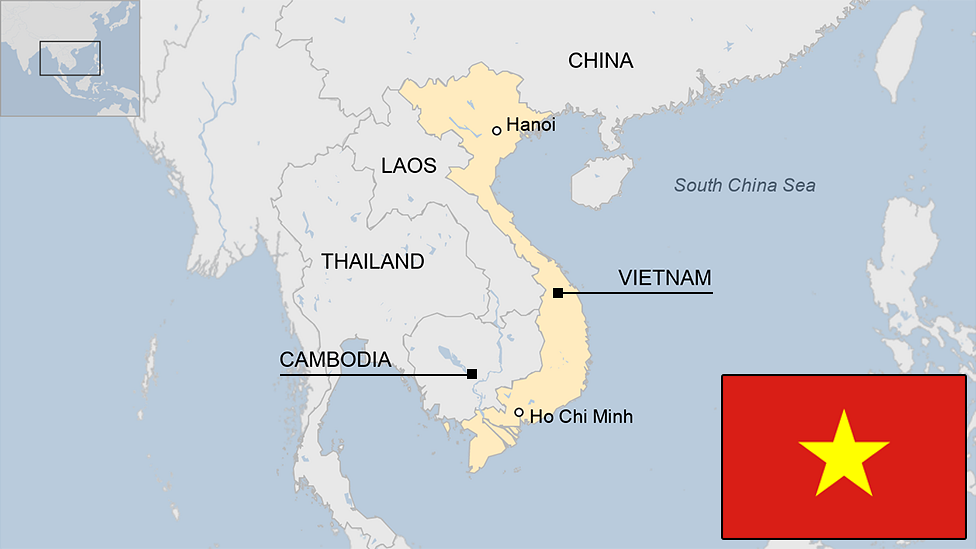Power struggle behind Vietnam tycoon's arrest?
- Published
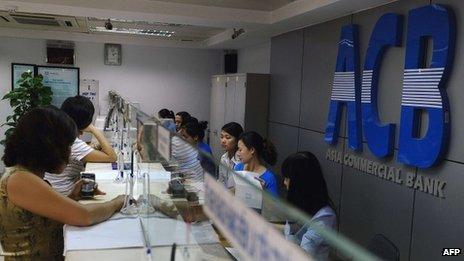
Mr Kien is one of the founders of the Asian Commercial Bank (ACB)
The BBC's Nga Pham asks whether the arrest last week of Vietnamese tycoon Nguyen Duc Kien is linked to a battle between top leaders over the country's rapid economic growth, among other issues.
Watching Nguyen Duc Kien on the sidelines of Hanoi's Hang Day stadium, the training ground for his football club Hanoi ACB, it was hard to tell he was one of the richest people in Vietnam.
Short, clad in a modest-looking striped shirt and dark trousers, Mr Kien looked exactly like many of the excitable, football-mad Vietnamese men around him.
But a closer inspection revealed signs of wealth - a gold-rimmed watch on his wrist and a special-edition Rolls Royce Phantom waiting outside the stadium to take him home.
Nguyen Duc Kien could be compared to Roman Abramovich, the owner of Chelsea FC, and not only because of their shared passion for football.
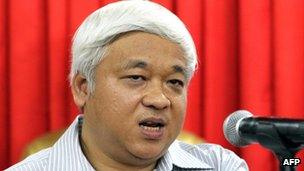
From humble beginnings, Nguyen Duc Kien became a billionaire with diverse business interests
Like the Russian tycoon, Mr Kien came from a humble background, attended state schools and served a short stint in the army.
The biggest similarity, however, is that the two men - both now in their 40s - grew up in Communist societies and flourished in the transition from a centralised to market economy.
In the decades since Vietnam adopted its economic "renovation" policy, Mr Kien has amassed estimated wealth of nearly $1bn (£632.7m), running multiple businesses and gaining measureable influence in the country's finance and banking sector.
He is one of the founders of the Asian Commercial Bank (ACB) and holds a large amount of shares in it, as well as in some other private banks.
News of his arrest on 20 August sent shockwaves through Vietnam's financial system, leading to a loss of more than $5bn in stock values in just a few days.
Officially, Mr Kien is being held for investigation into alleged illegal business activities.
But Le Dang Doanh, a leading Vietnamese economist, said that while it could be indicative of a clean-up in the banking sector, "nobody believes that this is only related to his private business activities".
'Self-criticism' campaign
Vietnam's economy, after decades of high growth, is facing serious problems - high inflation, bad debt, rampant corruption and a hidebound state sector to name a few.
These economic uncertainties have caused massive public grievances over slipping living standards and the unfair distribution of wealth.
The scale of public discontent had led to fears among top leaders that the situation could spiral out of control and create a direct threat to the regime.
Analysts link Mr Kien's arrest with the on-going "criticism and self-criticism" campaign within the Vietnamese Communist Party leadership.
The campaign, which has been going on for a couple of months now, is aimed at finding and rectifying wrongdoing by the party's top cadres, strengthening the role of the Communist Party along the way.
It is also seen as an obvious battleground for various factions within the leadership.
Vietnam's tycoons need excellent political connections - "No one in Vietnam amasses great wealth without intimate connections with powerful members of the Vietnam Communist Party," says Carlyle Thayer, an well-known Vietnam expert at the University of New South Wales in Australia.
Mr Kien is said to be closely linked to the Vietnamese prime minister and his circle, especially the PM's daughter Nguyen Thanh Phuong, who is one of the country's most prominent private bankers.
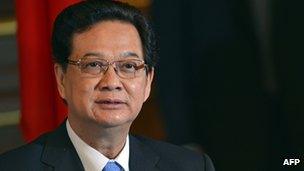
Some of Prime Minister Nguyen Tan Dung's economic policies have come under fire
Nguyen Tan Dung, arguably the most powerful prime minister since 1975, has been promoting economic reform but recently came under fire after some of his economic policies proved disastrous.
In particular, Mr Dung's ambitious plan to revamp the state sector and create chaebol-like conglomerates was seen as fuelling bad debt and adding to economic pressure.
Stephen Norris, an analyst at Control Risks Group in Singapore, said that "a more likely explanation may be that Mr Kien is caught up in an attempt to weaken Prime Minister Nguyen Tan Dung".
"In this scenario, Mr Kien's detention can be seen as the latest instalment in a power struggle between Prime Minister Dung and his rivals at the top of the Communist Party of Vietnam," said Mr Norris.
His rivals here are understood to be President Truong Tan Sang and his allies, who are more concerned that political stability is being sacrificed for rapid economic growth - potentially threatening one-party rule.
'Scapegoat'
That is exactly why the Communist Party's critics in Hanoi, such as dissident lawyer Le Quoc Quan, believe that the current "mini-war" will just stop here.
"Politburo members, including the prime minister and the president, may have conflicting personal agendas but they share the mutual interest of defending the Communist Party's rule," Mr Quan said.
"They need a scapegoat for the economic failure, and what is more convenient than budding capitalists?"
So Mr Kien could be a potential scapegoat, a high-profile scalp to assuage public discontent.
In a hastily drafted National Day speech, published in state media 10 days early on 22 August right after the banking scandal broke, President Truong Tan Sang called for solidarity among party members in order to overcome "destabilising elements".
"… Solidarity and consensus are must-have requirements," Mr Sang wrote. "Whatever [runs] against those requirements should be eliminated."
- Published24 August 2012
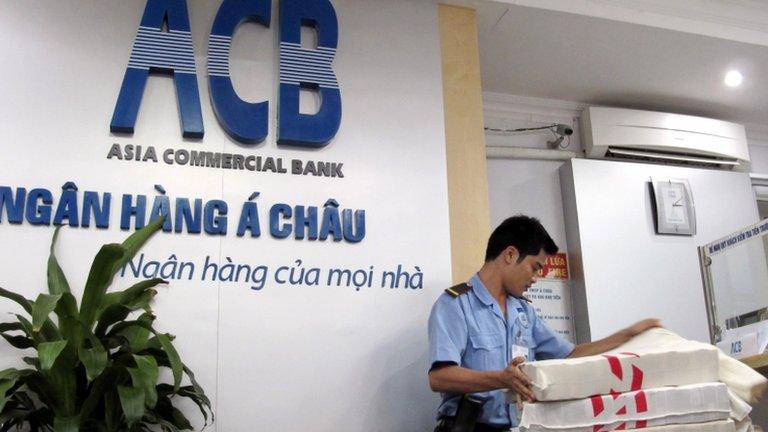
- Published23 August 2012
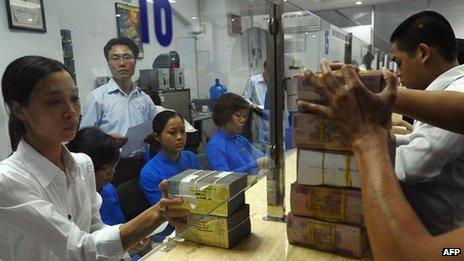
- Published21 August 2012
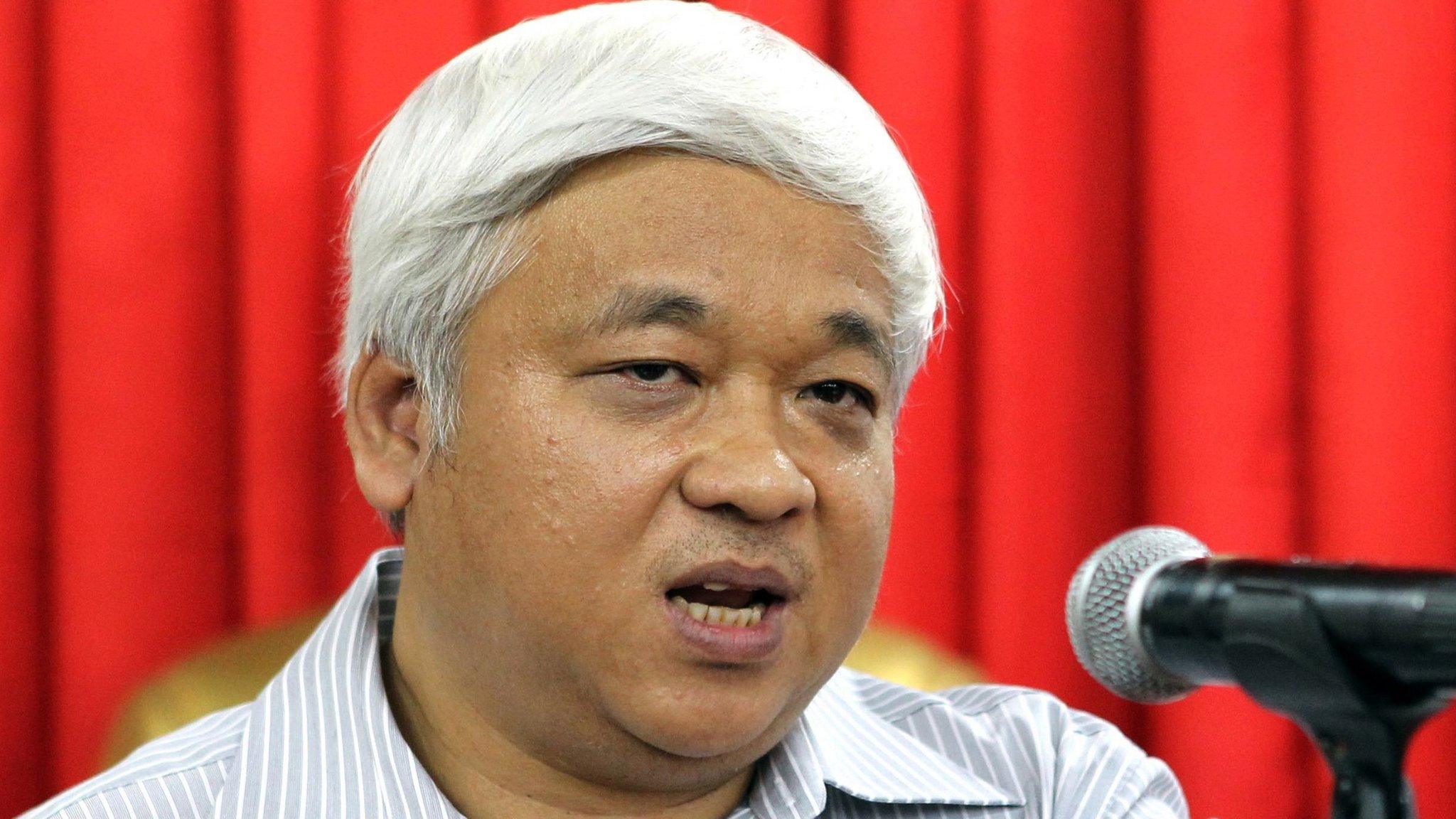
- Published23 October 2024
